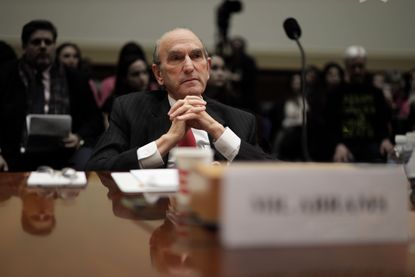Elliot Abrams and the absurd paradoxes of American foreign policy
It's crucially important that we come to understand how a man with Abrams' resume could end up treated like royalty in the nation's capital


Only in America could a man best known for enacting policies that led to mass murder, participating in a criminal conspiracy to subvert the will of Congress, and helping to plan and execute a war that destabilized an entire region and resulted in more than a hundred thousand deaths be chosen to lead yet another delicate foreign policy mission and then enjoy the fulsome support of the country's bipartisan national security establishment who passionately defend him as "a leading advocate of human rights and democracy."
I'm talking, of course, about Elliott Abrams, President Trump's choice of special envoy to Venezuela, who faced blunt, sometimes rude questioning from Rep. Ilhan Omar (D-Minn.) before the House Foreign Relations Committee on Wednesday. The grilling sparked a tidal wave of outrage and umbrage among leading members of the foreign policy community, many of whom viewed Abrams' treatment as a violation of decorum and an affront against a card-carrying member of the club of Very Serious Policy Intellectuals who have devoted their lives and careers to helping the United States lead the free world.
It's crucially important that we come to understand how a man with Abrams' resume could end up treated like royalty in the nation's capital — and why, by American standards, this seemingly unlikely confluence of events really isn't that unlikely at all but rather far closer to something like an inevitability.
Subscribe to The Week
Escape your echo chamber. Get the facts behind the news, plus analysis from multiple perspectives.

Sign up for The Week's Free Newsletters
From our morning news briefing to a weekly Good News Newsletter, get the best of The Week delivered directly to your inbox.
From our morning news briefing to a weekly Good News Newsletter, get the best of The Week delivered directly to your inbox.
To become an honorary member of the U.S. foreign policy establishment, one must affirm two contrary views about the country. Because these views partially contradict each other, holding them both in one's mind can be a challenge. But once it's accomplished, a whole range of wondrous things become possible, including magical thinking about the malleability of the world and the capacity to evade responsibility for both morally treacherous behavior and outright failure.
The first of these views holds that the United States is a righteous country that invariably acts on the side of the angels. Our ends are noble, our principles pure, and decent people everywhere benefit enormously from our leadership. We stand for the freedom and dignity of all, with God, humanitarians, and all people of good will applauding our actions. This was true in World War II, during the Cold War, and since then, up to and through the War on Terror. The liberal international order that encourages rule-following and negotiation while fostering peace and prosperity among nations is our handiwork, as is the democratic world we have nurtured around the globe. Those who oppose us in defending this order are evildoers, pure and simple, and we'll seek to demonstrate this by pointing to every bad thing they've ever done as evidence of their inherent treachery and malevolence.
We're idealists, in other words. Moral, well-meaning, law-abiding, leading by principle and example in everything we do.
But that's only one half of the equation. America might be unwaveringly moral, but we are also tough, ruthless, hard-nosed, realistic about the ugly ways of the world, like a sheriff toiling to establish a modest and vulnerable zone of order in a lawless land. In such a world, the ends often justify the means. When fighting our enemies, we need to be willing to do whatever it takes to prevail. We have no choice. We need to win and our opponents need to lose. History is written by the victors and no one ever came out on top by playing nice, staying pure, or keeping their hands clean.
Put these two positions together — a conviction about our innate decency and the purity of our motives with a willingness to do anything to come out on top in a conflict — and a number of ... remarkable things follow. For one thing, unlike the bad guys, whose every unsavory deed deserves to be treated as an exemplification of their wickedness, our seemingly malicious actions appear to be rare exceptions, wholly excused by the lamentable necessities that govern a fallen world.
The firebombing of Dresden, Hamburg, and Tokyo; the atomic bombing of Hiroshima and Nagasaki; the carpet bombing of North Korea, North Vietnam, Cambodia, and Laos; the Chilean coup that put Pinochet in power; the anti-Communist Latin American death squads that Elliott Abrams helped to encourage and fund; My Lai and Abu Ghraib. Exceptions? Or the rule? America's foreign policy establishment has no doubt at all what to call them. They are unfortunate but unavoidable examples of collateral damage that follow from doing the right thing. There's no way around it. Stuff happens. Nasty stuff. But none of it invalidates America's righteousness.
The one-way ticket out of self-examination even extends to success. American policymakers will cheerfully forgive each other for acts of injustice they wouldn't hesitate to denounce if they were undertaken by countries on the opposite side of a conflict. But they will also forgive their own failures. Egregious, draw-dropping failures. No error is too great, no consequence too grave, to get an analyst or policymaker dismissed from the ranks of the wise. Which is one reason why nearly identical mistakes are made or proposed again (Iraq) and again (Libya) and again (Syria) and again (Venezuela).
"He meant well": That sentiment makes everything possible. Abrams didn't mean to do anything wrong in Guatemala or El Salvador. He didn't mean to break the law in helping to cover up the funding of the Nicaraguan Contras with money earned by selling clandestine arms to Iran. He didn't mean to make a catastrophic misjudgment about the threat posed by Saddam Hussein and the necessity of toppling the Iraqi government. He was trying to do the right thing. He'll be trying to do the same in working to overthrow the Maduro government in Caracas and replace it with what we're all certain will be a much nicer regime backed up by the very nice leadership of the Venezuelan military. What could possibly go wrong?
But it doesn't really matter. Abrams means well. And so do the members of the foreign policy establishment of the United States. They always do. Every single time. And that, it seems, is the only thing that counts.
Sign up for Today's Best Articles in your inbox
A free daily email with the biggest news stories of the day – and the best features from TheWeek.com
Damon Linker is a senior correspondent at TheWeek.com. He is also a former contributing editor at The New Republic and the author of The Theocons and The Religious Test.
-
 Can 'slow shopping' help you spend less this holiday season?
Can 'slow shopping' help you spend less this holiday season?The explainer You may feel pressured to act fast in order to get the best deals — but this can lead to superfluous spending
By Becca Stanek, The Week US Published
-
 Crossword: November 15, 2024
Crossword: November 15, 2024The Week's daily crossword puzzle
By The Week Staff Published
-
 Sudoku medium: November 15, 2024
Sudoku medium: November 15, 2024The Week's daily medium sudoku puzzle
By The Week Staff Published
-
 US election: who the billionaires are backing
US election: who the billionaires are backingThe Explainer More have endorsed Kamala Harris than Donald Trump, but among the 'ultra-rich' the split is more even
By Harriet Marsden, The Week UK Published
-
 US election: where things stand with one week to go
US election: where things stand with one week to goThe Explainer Harris' lead in the polls has been narrowing in Trump's favour, but her campaign remains 'cautiously optimistic'
By Harriet Marsden, The Week UK Published
-
 Is Trump okay?
Is Trump okay?Today's Big Question Former president's mental fitness and alleged cognitive decline firmly back in the spotlight after 'bizarre' town hall event
By Harriet Marsden, The Week UK Published
-
 The life and times of Kamala Harris
The life and times of Kamala HarrisThe Explainer The vice-president is narrowly leading the race to become the next US president. How did she get to where she is now?
By The Week UK Published
-
 Will 'weirdly civil' VP debate move dial in US election?
Will 'weirdly civil' VP debate move dial in US election?Today's Big Question 'Diametrically opposed' candidates showed 'a lot of commonality' on some issues, but offered competing visions for America's future and democracy
By Harriet Marsden, The Week UK Published
-
 1 of 6 'Trump Train' drivers liable in Biden bus blockade
1 of 6 'Trump Train' drivers liable in Biden bus blockadeSpeed Read Only one of the accused was found liable in the case concerning the deliberate slowing of a 2020 Biden campaign bus
By Peter Weber, The Week US Published
-
 How could J.D. Vance impact the special relationship?
How could J.D. Vance impact the special relationship?Today's Big Question Trump's hawkish pick for VP said UK is the first 'truly Islamist country' with a nuclear weapon
By Harriet Marsden, The Week UK Published
-
 Biden, Trump urge calm after assassination attempt
Biden, Trump urge calm after assassination attemptSpeed Reads A 20-year-old gunman grazed Trump's ear and fatally shot a rally attendee on Saturday
By Peter Weber, The Week US Published